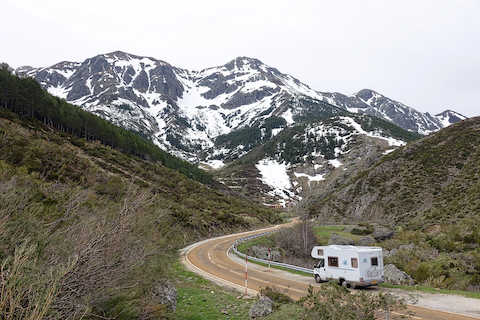
We’ve prepared these winter road trip tips because highway safety is a major concern on winter family adventures. With the anticipation of the holidays and exciting snow fun adventures comes sometimes treacherous — rainy, icy, snowy — driving conditions.

Driving slowly and carefully is a must, but we also have some common sense road safety tips that are worth repeating. And don’t forget to carry a first aid kit in the car with you, at any time of year. This is especially important if you have children or the elderly riding with you.
10 Safety Tips for Winter Road Trips
1. Know what winter weather advisories mean. The National Weather Service issues several cautions; understand what they mean before you hit the road:
- Winter weather advisories are for conditions that may be hazardous, but should not become life threatening when using caution.
- Winter storm watches mean that severe winter conditions may affect your area and are issued 12-36 hours in advance of major storms.
- Winter storm warnings mean a storm bringing four or more inches of snow/sleet is expected in the next 12 hours, or six or more inches in 24 hours.
- Blizzard warnings mean snow and strong winds will produce blinding snow, deep drifts, and a life-threatening wind chill.
2. Let someone know your timetable and travel route. This is especially important if you’ll be driving in areas with little traffic, rural locations, or large park areas.
3. Prevention is the best medicine: Driving slowly and maintaining plenty of room between you and the next car is the easiest way to avoid accidents. We all want to get to our destination faster but that extra 30 minutes could save your life. In bad weather, allow for three-to-12 times more stopping distance depending on the size of your vehicle. Also, be vigilante of sledders while in neighborhoods. Children often lose control and slide right into the street.
4. Stock your car with winter essentials: A shovel, broom, ice scraper, jumper cables, blankets, flashlight, warning devices (flares), sand or kitty litter, and high-calorie non-perishable food. It’s also a good idea to stock the car with emergency supplies like baby formula and diapers, just in case.
5. Keep spare, charged batteries for cell phones in your car. Duracell and others make instant chargers for popular phones such as the iPhone. If your car battery dies, you will be glad you spent the extra $15 to reach help. If you regularly travel to very remote areas where cell towers are few and far between, consider investing in a satellite telephone or an in-car service like On-Star.

6. Keep your gas tank full to prevent the fuel line from freezing. This is a a major winter road trip tip. Also, make sure the windshield wiper fluid reservoir is full.
7. Check to make sure your lights and windshield wipers are functioning properly. In most states it is illegal to drive if either is malfunctioning; and in certain weather situations it is also extremely unsafe.
8. Know your health insurance plan’s emergency care policies. What kind of doctors can you visit? If you have in-network benefits what happens if you need medical care beyond your home city or state? Are you charged differently for treatment at a hospital emergency room (without being admitted) or an emergency walk-in clinic?
9. If you get stuck in the snow, stay in your car – it’s your best shelter. Winter road trippers say don’t leave unless help is within 100 yards. The Red Cross advises drivers to tie a brightly colored cloth (preferably red) to the antenna for rescuers to see. You should run the engine 10 minutes every hour to power the heat and the overhead lights. Be sure to keep a window away from the blowing wind slightly ajar.
10. Essential winter road trip tip! Don’t drive under the influence of anything. Nearly 60% of accidents are the result of improper driving. Whether you’ve had a bit too much pie or a bit too much pilsner, don’t drive until you are fully awake and not impaired by anything. Most adults know well enough not to drink and drive, but few realize accidents are just as easily caused by being drowsy or impaired by legal drugs like cold medicines. When in doubt, pull to the side of the road or check into a motel for a quick nap.
11. Remove bulky clothing before strapping little ones into their car seats: You may just be keeping your baby warm, but by leaving bulky coats on before harnessing your child in you’re lowering the effectiveness of their car seats. In the unlikely event of a crash, an item like a bulky jacket will compress, leaving the harness loose and your child vulnerable to injury. Secure straps so that they are snug and close to the body. If you’re worried about your child getting cold, tuck the discarded jacket around your baby after strapping he or she has been strapped in.
12. Check the tailpipe for snow: Before leaving, remove any snow clogging up the tailpipe to prevent issues from the dangerous carbon monoxide gas.
Thanks to Rand McNally, Julie Kleinert and Kate Carr for their road safety tips.
Dear Reader: This page may contain affiliate links which may earn a commission if you click through and make a purchase. Our independent journalism is not influenced by any advertiser or commercial initiative unless it is clearly marked as sponsored content. As travel products change, please be sure to reconfirm all details and stay up to date with current events to ensure a safe and successful trip.